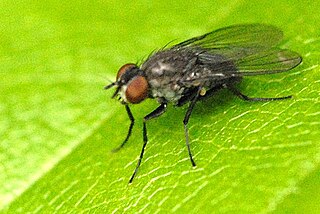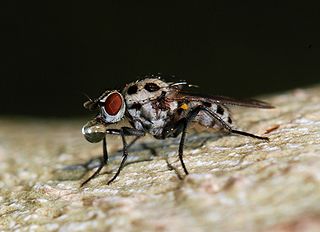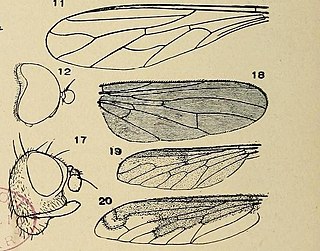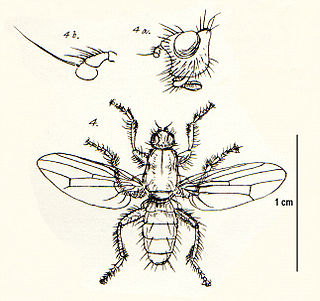
Cluster flies are flies of the genus Pollenia in the family Polleniidae. Unlike the more familiar blow flies, such as the bluebottle genus Phormia they do not lay eggs in human food. They parasitise earthworms; the females lay their eggs near earthworm burrows, and the larvae then feed on the worms. But the biology of this group is relatively poorly known and a few have been recorded from other hosts including caterpillars and bees.

Canacidae, incorrectly Canaceidae, or beach flies, surf or surge flies, is a family of Diptera. As of 2010, 307 species in 27 genera. The family now includes Tethininae as a subfamily.

The Coelopidae or kelp flies are a family of Acalyptratae flies, they are sometimes also called seaweed flies, although both terms are used for a number of seashore Diptera. Fewer than 40 species occur worldwide. The family is found in temperate areas, with species occurring in the southern Afrotropical, Holarctic, and Australasian regions.

Trupanea is a genus of tephritid or fruit flies in the family Tephritidae.

Coenosia is a very large genus of true flies of the family Muscidae. Coenosia are known as tiger flies since they are predators and hunt many kinds of insects and other invertebrates.

The Helosciomyzidae are a small family of flies found exclusively in the Southern Hemisphere. With the exception of the South American genus Sciogriphoneura, helosciomyzids occur only in Australia and New Zealand.

Anthomyia is a genus of flies in the family Anthomyiidae. They look rather like small houseflies, but commonly have conspicuous black-and-white patterning. This appears to be a mild form of aposematic coloration, though they do not appear to be distasteful unless they have eaten something offensive to the predator and have loaded their guts with it.

Heterocheila is a genus of acalyptrate true flies (Diptera). They are placed in their own family, Heterocheilidae, in the superfamily Sciomyzoidea. They are not widely familiar outside entomological circles, but the common name "half-bridge flies" has been associated with them. They are medium-sized flies occurring mainly in temperate regions on seashores of the Northern Hemisphere, where they and their larvae typically feed on stranded kelp in the wrack zone. In this, they resemble kelp flies, which are members of a different family, though the same superfamily.

Stenomicra is a genus of flies in the family Periscelididae. There are more than 20 described species in Stenomicra.

Fucellia is a genus of seaweed flies in the family Anthomyiidae. There are at least 20 described species in the genus Fucellia.

Helcomyza is a genus of flies in the family Helcomyzidae. There are at least three described species in Helcomyza.

Cryptochetum is a genus of scale parasite flies in the family Cryptochetidae. There are more than 30 described species in Cryptochetum.
Brontaea is a genus of house flies, insects in the family Muscidae. There are about five described species in Brontaea.

Coelopa is a genus of kelp flies in the family Coelopidae. There are about 14 described species in Coelopa.

Chaetocoelopa is a genus of kelp flies in the family Coelopidae.
Glumini is a tribe of kelp flies in the family Coelopidae.
Coelopinae is a subfamily of kelp flies in the family Coelopidae.
Paractora is a genus of flies in the family Helcomyzidae.
Toxopoda is a genus of flies in the family Sepsidae.















